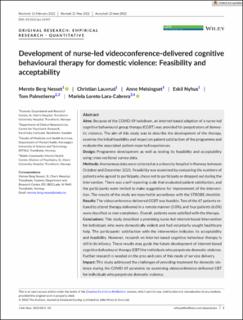| dc.contributor.author | Nesset, Merete Berg | |
| dc.contributor.author | Lauvrud, Christian | |
| dc.contributor.author | Meisingset, Anne | |
| dc.contributor.author | Nyhus, Eskil | |
| dc.contributor.author | Palmstierna, Tom Krisman Kule | |
| dc.contributor.author | Lara Cabrera, Mariela Loreto | |
| dc.date.accessioned | 2023-04-27T11:55:59Z | |
| dc.date.available | 2023-04-27T11:55:59Z | |
| dc.date.created | 2022-09-27T11:16:19Z | |
| dc.date.issued | 2022 | |
| dc.identifier.citation | Journal of Advanced Nursing. 2022, . | en_US |
| dc.identifier.issn | 0309-2402 | |
| dc.identifier.uri | https://hdl.handle.net/11250/3065321 | |
| dc.description.abstract | Aims: Because of the COVID-19 lockdown, an internet- based adaption of a nurse- led cognitive behavioural group therapy (CGBT) was provided for perpetrators of domes-tic violence. The aim of this study was to describe the development of the therapy, examine the initial feasibility and impact on patient satisfaction of the programme and evaluate the associated patient- reported experiences. Design: Programme development as well as testing its feasibility and acceptability using cross-sectional survey data. Methods: Anonymous data were collected at a university hospital in Norway between October and December 2021. Feasibility was examined by comparing the numbers of patients who agreed to participate, chose not to participate or dropped out during the intervention. There was a self- reporting scale that evaluated patient satisfaction, and the participants were invited to make suggestions for improvement of the interven-tion. The results of the study are reported in accordance with the STROBE checklist. Results: The videoconference-delivered CGBT was feasible. Two of the 67 patients re-fused to attend therapy delivered in a remote manner (3.0%), and four patients (6.0%) were classified as non-completers. Overall, patients were satisfied with the therapy. Conclusions: This study described a promising nurse- led internet- based intervention for individuals who were domestically violent and had voluntarily sought healthcare help. The participants' satisfaction with the intervention indicates its acceptability and feasibility. However, research on internet- based cognitive behaviour therapy is still in its infancy. These results may guide the future development of internet- based cognitive behavioural therapy (CBT) for individuals who perpetrate domestic violence. Further research is needed on the pros and cons of this mode of service delivery. Impact: This study addressed the challenges of providing treatment for domestic vio-lence during the COVID-19 pandemic by examining videoconference-delivered CBT for individuals who perpetrate domestic violence. | en_US |
| dc.language.iso | eng | en_US |
| dc.publisher | Wiley | en_US |
| dc.rights | Navngivelse 4.0 Internasjonal | * |
| dc.rights.uri | http://creativecommons.org/licenses/by/4.0/deed.no | * |
| dc.title | Development of nurse-led videoconference-delivered cognitive behavioural therapy for domestic violence: Feasibility and acceptability | en_US |
| dc.title.alternative | Development of nurse-led videoconference-delivered cognitive behavioural therapy for domestic violence: Feasibility and acceptability | en_US |
| dc.type | Peer reviewed | en_US |
| dc.type | Journal article | en_US |
| dc.description.version | publishedVersion | en_US |
| dc.source.pagenumber | 10 | en_US |
| dc.source.journal | Journal of Advanced Nursing | en_US |
| dc.identifier.doi | 10.1111/jan.15347 | |
| dc.identifier.cristin | 2055818 | |
| cristin.ispublished | true | |
| cristin.fulltext | original | |
| cristin.qualitycode | 2 | |

